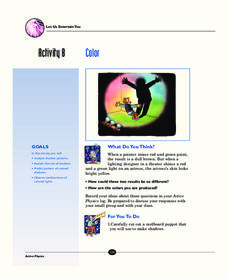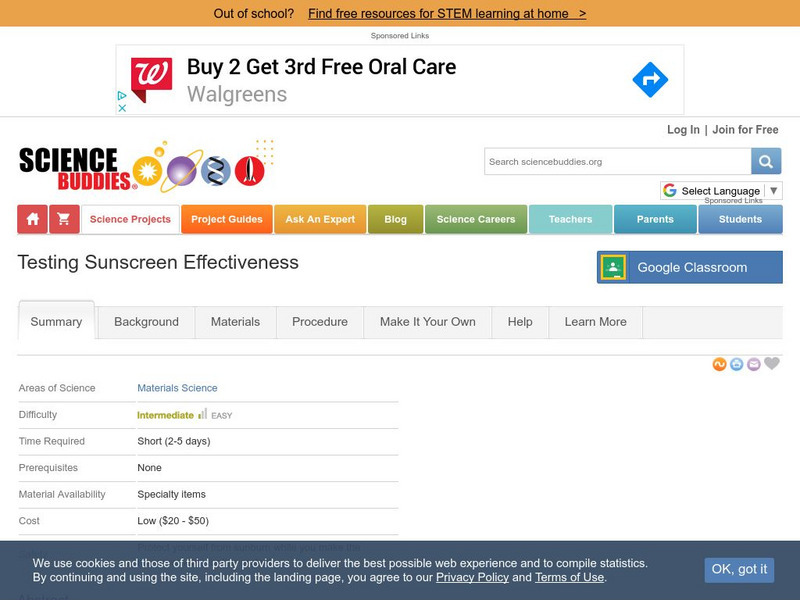American Museum of Natural History
See the Light
It's time to see the light! Scholars perform three different experiments with light to reveal properties using a great remote learning resource. The pupils see how light reflects from a surface and refracts through different materials....
Curated OER
Reflection and Refraction
Life is only a reflection of what we allow ourselves to see. The lesson includes three experiments on light reflection, light refraction, projection, lenses, and optical systems. Each experiment builds off the ones before and...
It's About Time
Refraction of Light
Don't shine like a diamond, refract light like a diamond. Young scientists use an acrylic block and a laser light to observe refraction. Advanced scholars figure the sine of the angles of reflection and incidence as well as mastering...
It's About Time
Reflected Light
The lesson allows young scientists to use lasers and mirrors to study reflected light. A reading passage and homework question assess learning, while additional material introduces extension activities.
Teach Engineering
Light Intensity Lab
Let there be light. The last installment of a seven-part series has pupils conduct an experiment on light attenuation through different numbers of transparency sheets. They then relate the results back to how X-rays measure bone density.
Exploratorium
Touch the Spring
Concave mirrors and the images they produce are traditional topics in the physics classroom. This resource explains how to set up an investigation of them, and it provides you with the explanation of concepts.
California Academy of Science
Kinesthetic Astronomy: Longer Days, Shorter Nights
A lamp, four globes, and some signs taped around the room are all you need to set up a solar system simulation for teaching how Earth's tilted axis creates the seasons. (Sticky dots are also needed, but not mentioned in the materials...
Exploratorium
Water Sphere Lens
With a Florence flask or fishbowl, make a double convex lens and use it to examine an image. Because of the refraction, the image will be inverted. A simple explanation is provided here for you to share with your class as they...
It's About Time
Color
How can a hand puppet's shadow look like a dog? The lesson explains the science behind shadows, combining paint colors and the colors used in old televisions. Scholars use white, red, blue, and green lights to experiment with colors...
Exploratorium
Parabolas
A parabolic mirror toy demonstrates how concave mirrors objects reflect light and produce a realistic image at their focal point. This resource probably doesn't explain any more than the printed insert that accompanies such an apparatus...
University of Waikato
Māui and the Sun
Using a Maori legend, How Maui Tamed the Sun, youngsters are introduced to the importance of sunlight to civilization. Teach them about nuclear fusion that occurs to produce the solar energy we later receive on Earth as...
Curated OER
Activity Guide for Snow
Create a cross-curricular learning experience around a shared reading of Cynthia Rylant's book Snow. From writing poetry and a singing a song about snow, to creating paper snowflakes and solving math story problems, this resource...
Big Kid Science
Create a Milk Carton Camera to Observe the Eclipse!
Step aside, fancy glasses... it's time to create a solar eclipse viewing camera of your own using nothing more than a milk carton.
Science Buddies
Science Buddies: Project Ideas: Don't Get Burned: Uv Index Throughout the Day
Sun tanning has a bad rap right now. Use a personal ultraviolet monitor to measure the UV index to prevent getting a sunburn. With this science fair project you will create a chart showing the UV ray measurement at different times of the...
Science Buddies
Science Buddies: Technicolor Shadows: Lessons in Light and Color
Is that right side of your brain yearning to express its artistic side? This is a project that blends art with science. Learn about light and colorful shadows in these experiments where you mix and match various colors of light to create...
Science Buddies
Science Buddies: Testing Sunscreen Effectiveness
The goal of this project is to measure the effectiveness of different sunscreen products for blocking ultraviolet-A (UVB) and ultraviolet-B (UVB) rays from sunlight. This project shows you how to use a UV detector to measure rays of light.
Center of Science and Industry
Cosi Columbus: Two Lenses in One
Investigate the behavior of a water filled vial, and discover why it acts like a magnifier. Includes full list of materials, procedures, and scientific explanation of what causes light rays to change direction.
Other
Escolar.com: La Luz
A brief summary and illustrations of light and how the lights rays are reflected and bent.
PBS
Newton's Apple: Cancer Causes
In this lesson plan site from Newton's Apple, a production of KTCA Twin Cities Public Television in cooperation with the National Science Teachers Association, the causes of cancer are discussed. Several cancer causing agents are also...
Exploratorium
Exploratorium: Science Snacks: Look Into Infinity
In this activity students will create images of images of images that can repeat forever. Students will recreate this effect by setting up two acrylic plastic mirrors.
Read Works
Read Works: Electromagnetic Radiation
[Free Registration/Login Required] An informational text about electromagnetic radiation and the effects it creates. A question sheet is available to help students build skills in reading comprehension.
Exploratorium
Exploratorium: Water Sphere Lens
A discussion of how to make a magnifying lens exhibit using a water-filled flask and a light bulb. Consists of assembly instructions and a "To do and notice" section. Great for a teacher demonstration or a student project.




















